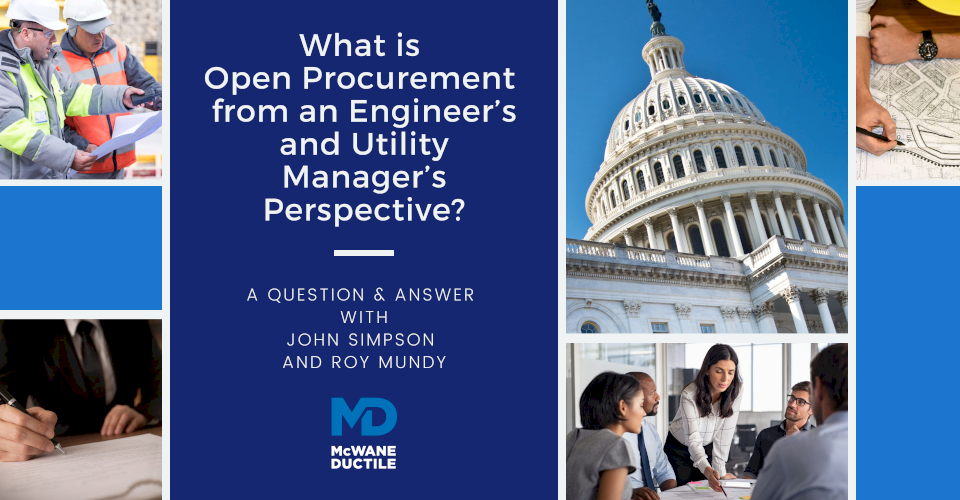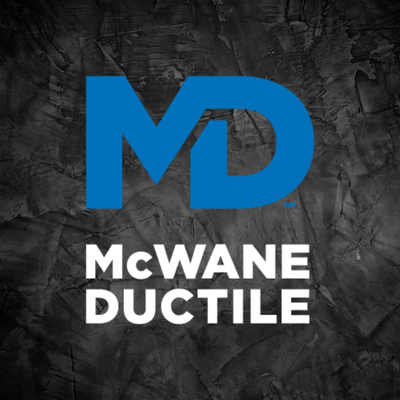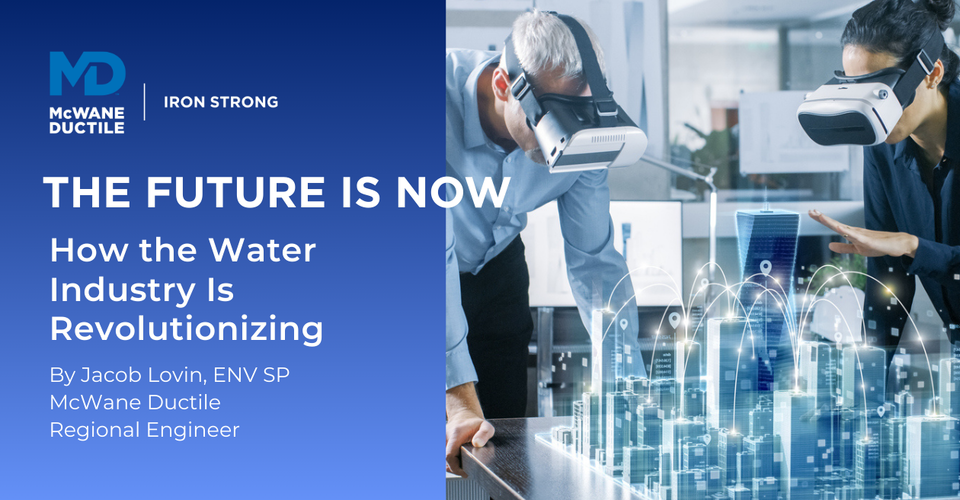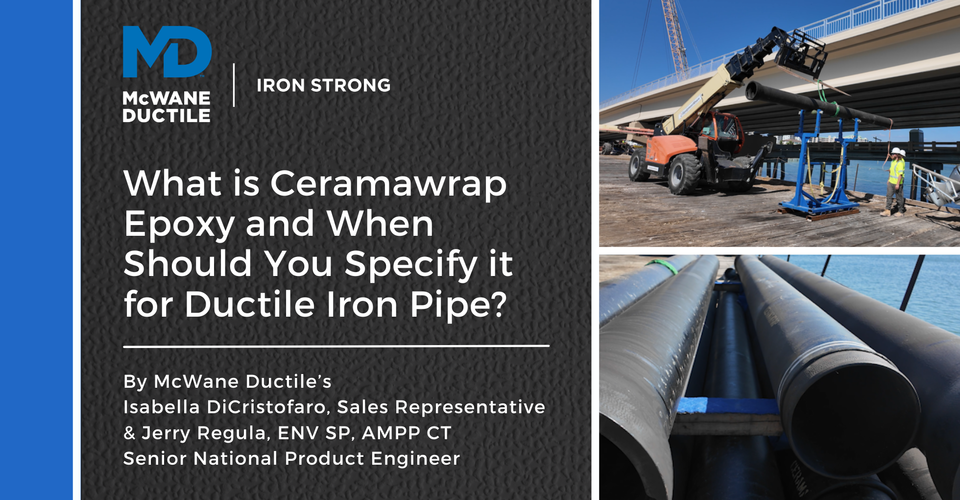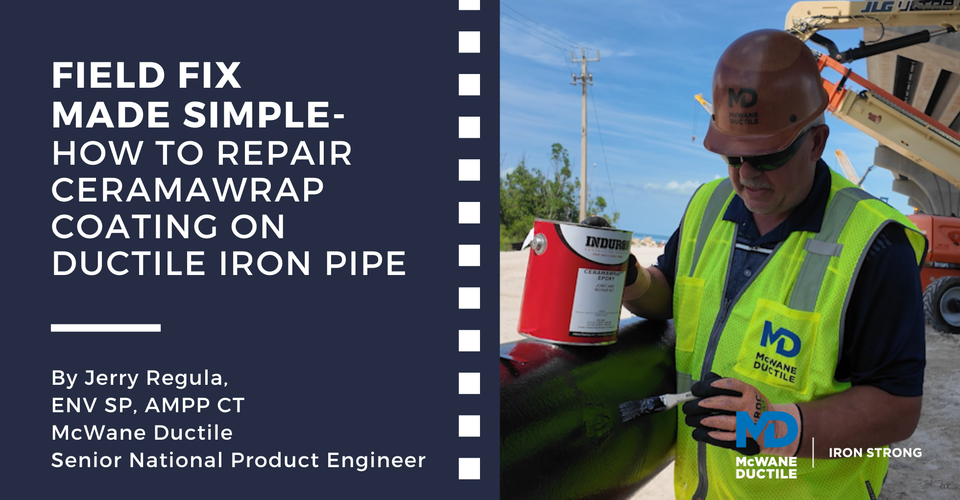There is a national effort to deny engineers, utilities, municipalities, public entities, and other waterworks professionals the ability to design water, wastewater, and stormwater projects in the manner that best serves the needs of their community. This effort focuses on water system piping but could be expanded to other infrastructure materials, as well. This blog contains a Q&A session conducted with a civil engineer, John Simpson, and a former utility manager, Roy Mundy, regarding Open Procurement.
QUESTION: Tell us a little about your background as an Engineer?
ANSWER - Simpson: John Simpson, P.E., ENV SP, NACE CT. As a registered civil engineer, I was required to graduate from an abet credited university, work under a registered engineer for four years, pass two 8-hour state-certified examinations, and continually educate myself on various topics within civil engineering. In my career, I’ve had the opportunity to serve as an engineer on various civil engineering projects. These projects provided a better quality of life for the public, and I am proud to have been afforded an engineer's responsibility. Currently serving as a Regional Engineer for McWane Ductile.
ANSWER - Mundy: Roy Mundy, P.E., ENV SP, ASSOC. DBIA. I have had the privilege in my water industry career to serve as both engineer and within the executive ranks for the nation's largest investor-owned water utility ─ the American Water System. Owning water subsidiaries across the country that serve millions of people provides many challenges in assuring that customers are provided with a safe and adequate water supply. Throughout the three decades with American Water, I experienced many challenges in selecting proper materials for building new pipelines, reconstruction, maintenance, and repair. Currently serving as a Senior Regional Engineer for McWane Ductile.
QUESTION: Can you provide some background on Open Procurement?
ANSWER - Simpson: I have read about a recent legislative trend within the utility industry concerning the open procurement of materials. Open Procurement is defined as a method that requires procurements to be available to all qualified and interested bidders, be appropriately advertised, have objective qualifications criteria, and be awarded to the least-cost provider without contract negotiations.
ANSWER - Mundy: Legislative attempts have been made in several states across the country to take the decision-making expertise of engineers and operating personnel out of their hands and place it into legislative mandates. In 2014, state legislation was introduced and defeated in Indiana, Tennessee, and Ohio. The legislation did not make it out of Committee in Ohio and Tennessee and could not get the votes to bring it to the Senate floor in Indiana. In 2015, state legislation was introduced in Arkansas, North Carolina, Oklahoma, and South Carolina. The legislation has yet to pass in any state.
As described in the synopsis of the Ohio bill, the purpose is “to ensure that all proven and acceptable piping materials be included in bids for water and wastewater utility service improvement projects.” In these states, we have seen widespread opposition to the legislation from groups such as engineers, utilities, public entities, architects, and the business community.
QUESTION: How do you feel about Open Procurement?
ANSWER - Simpson: This sounds like a responsible approach to acquire materials or services just by reading it. However, that is before politics are involved. Several recent legislative attempts in several states across the country take the "objective qualifications criteria" out of the hands of qualified professionals, engineers, and utility personnel by passing laws requiring material decisions on infrastructure projects based upon initial material cost.
We all understand how important money is, and everyone should make the best decisions with our limited resources. But making decisions based solely on initial material cost is not wise, especially on infrastructure projects that will serve the public for tens of years.
Initial material cost does not mean that it is the best product for a utility. One should evaluate the cost of installation, maintenance and operation, lifecycle, and sustainability of materials to understand the overall cost. Who is better to do this than an engineer? Who has spent years educating, training, and evaluating all components relating to infrastructure projects or utility personnel who have spent years operating, maintaining, and servicing a utility that provides essential quality of life for the public?
ANSWER - Mundy: I could list numerous examples wherein engineering and operational professionals in the water industry, through their education, credentials, knowledge, and experience, have contributed through their expertise in building water infrastructure in this country second to none. Unfortunately, we are now seeing an attempt through political means to undermine engineering professionals from doing what they do best and what is undeniably what they do to better the water industry.
Clearly, these individuals work diligently to serve their clients and organizations, providing value-added recommendations regarding material selection for water systems. These recommendations go far beyond immediate costs, evaluating such parameters as sustainability, future operational costs, total life cycle costs, maintenance costs, and other factors.
QUESTION: Do you see Open Procurement as an issue in the waterworks industry?
ANSWER - Simpson: Yes. Local communities and engineers evaluate and select specific pipe or other materials based on numerous considerations, including environmental conditions at the site, the function of the material, and integration with existing infrastructure. We should not adopt a one-size-fits-all, top-down mandate from the government on decisions that licensed/qualified professionals can best handle.
ANSWER - Mundy: Yes. The original version of the legislation introduced in Indiana included a reference to one material – PVC pipe – clearly indicating that the legislation attempts to pick winners and losers in the marketplace through government regulation.
Pipe materials, for example, are not interchangeable and are not equal -- they have very different service lives, strength, operating costs, environmental considerations, safety concerns, and maintenance issues. The initial acquisition cost of a material is just one factor among many that must be considered when designing a pipeline. There are many long-term costs and other factors that determine pipe material selection.
The legislation will likely lead to a significant increase in bid protests and litigation over pipe selection on public projects, thereby wasting time and limited public resources.
QUESTION: Can you provide some real-world examples to help us understand the implications of the proposed Open Procurement?
ANSWER - Simpson: For example, if a water utility has high pressures within its piping system, the consulting engineer and utility personnel want to make sure the material chosen can handle the pressures over the design life of the waterline, not just the "initial design life." What good does it do the utility if it saves a small amount of money initially but then spends tens of thousands of dollars on operation, maintenance, and replacement because the material was unsuited to handle the system's high water pressures?
Another good analogy would be, what if a law passed that required all passenger vehicles to use one type of brake pad for the car? The owner would not have the option to pay a little more initial upfront money on higher-quality ceramic brake pads and receive better performance and longer brake life. Thus, making their overall cost of ownership much lower versus paying for brake pads twice because the initial lower cost brake pads wear out twice as fast as the higher quality brake pads. It just doesn’t make any sense.
ANSWER - Mundy: For more than 30 years managing a water utility, I experienced the challenges of selecting proper materials to build new pipelines, reconstruction, maintenance, and repair. One such “opportunity” involved maintaining a raw water supply for one of our water systems in West Virginia.
Our existing supply, the Ohio River, had been contaminated with a large oil spill emanating from Pennsylvania. Because we could not treat the waters that contained the oil plume, an alternate raw water supply had to be constructed within a very short time.
Once again, engineering and operating professionals rapidly addressed the issue, reviewed potential sources, and then designed the infrastructure to accommodate the needed supply until the oil spill passed our existing intake. The result—needed water for customers and fire protection was kept intact while the oil spill passed.
Another example included engineering professionals reviewing an intensive investigation wherein numerous alternatives provided additional raw water capacity to one of our major facilities serving over 350,000 people. The expertise employed evaluated many options, including pipelines to supply treated water, access to reservoirs to supply additional raw water, additional treatment facilities to be located on a viable raw water source, all-determining the most cost-effective way for our customers to mitigate this raw water deficiency. Once again, the result was—problem solved.
QUESTION: If you were standing before legislators at this moment, what would you tell them?
ANSWER - Simpson: Any laws that take the decision away from qualified engineers or utility personnel who have been trained to understand the complexities of designing and operating a utility will, in fact, create substandard utility infrastructure in this country that future generations will be paying for, for decades. Just like this recent, unfortunate, and tragic pandemic, let the professionals and science dictate what is best for the public. Please leave local infrastructure procurement decisions to the professionals who have spent years within the utility industry and not to politics — reject Open Procurement legislation.
ANSWER - Mundy: A government mandate to utilize materials based upon a short-sighted material cost review diminishes, if not eliminates, the tremendous resource experts have provided in the past and should provide in the future. Laws requiring a utility to utilize the cheapest material available without transparently specifying the engineering and operational personnel of that utility would have the ultimate decision will potentially create substandard water infrastructure in this country, infrastructure which has already been identified as in need of replacement due to age. Let’s replace that infrastructure the right way — leave it to the professionals!
In Summary
There is a national effort to deny engineers, utilities, municipalities, public entities, and other waterworks professionals the ability to design water, wastewater, and stormwater projects in the manner that best serves the needs of their community.
There are concerted attempts by the plastic pipe industry and its allies at the federal, state, and local levels to introduce preferential legislation for plastic pipe. This legislation has been introduced in at least 11 states, but none have passed the bills. The efforts continue to supersede the decisions of professionals, such as yourself, in determining the appropriate pipe for your community.
We thank Roy Mundy and John Simpson for their input and we encourage you to stand up for the right to make sound decisions in the interests of your community and be vigilant in discovering whether Open Procurement legislation is being considered in your state — support local choice. To learn more, visit www.dipra.org/government-affairs/local-choice.
Need Assistance with Your Waterworks Project?
If you have any questions regarding your water or wastewater infrastructure project, be sure to reach out to your local McWane Ductile representative. We have team members who've managed small and large water utility systems, served in engineering consulting firms, and bring decades of experience in solving field issues involving pipeline construction and operation. From design to submittal, to installation, we strive to provide education and assistance to water professionals throughout the water and wastewater industry.

